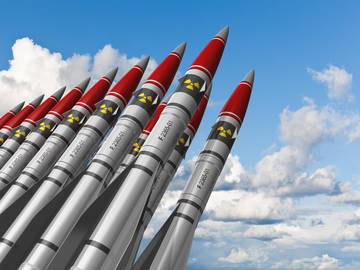Update: This word was added in February 2017.
The 2016 presidential campaign has its own distinctive vocabulary. Some words, like deplorable, are already defined in our dictionary. But others weren't common enough to merit their own headword until recently. The new surge in use moves these words into the category we refer to as Words We’re Watching for possible inclusion in the dictionary. Go nuclear is one such expression—and its heavy use in the presidential campaign may be altering its meaning.

The figurative sense of 'go nuclear' can mean "to behave in an unrestrained manner" ("I went nuclear on that bag of potato chips") or “to become furious; to resort to drastic measures in an attempt to undermine an opponent." Guess which meaning is becoming more common. Guess.
Here's the situation: go nuclear has historically had two distinct senses. The first one is literal: “to acquire or to utilize nuclear weapons or nuclear power.” The second one is figurative, and has a broader range of definition. (There is another sense of go nuclear that precedes both of these uses—“to work on a nuclear submarine”—but this sense is rarely used today.)
The election hasn't affected the literal sense of go nuclear, which people have been using since the mid-1950s:
Everybody’s going nuclear. No more had Great Britain announced plans for bigger and super hydrogen weapons than Australia tells about a $12,300,000 project involving a reactor near Sydney.
—The Philadelphia Inquirer, 21 Feb. 1955The British are determined to “go nuclear” and to do so without increasing over-all costs.
—St. Louis Post-Dispatch, 17 Jul. 1956
But the figurative sense of go nuclear is another story. This sense begins to show consistent use in the 1980s, and has multiple meanings, one of which—"to behave in an unrestrained manner"—is used much like the informal phrase go wild
And Cathy proceeds to go nuclear on a box of cookies.
—The Philadelphia Inquirer, 4 Oct. 1983Paul W. Smith. Don’t go nuclear celebrating your birthday! I’m watching! Love, Chrissie.
—(classified ad) Detroit Free Press, 18 Apr. 1987
Importantly, this figurative sense of going nuclear can also mean “to become furious; to resort to drastic measures in an attempt to undermine an opponent."
He has served notice that he is going to go nuclear against anyone who deviates from the crooked foreign policy line he had laid down.
—Arizona Republic (Phoenix, AZ), 17 Feb. 1984
It's this "furious/drastic measures" sense of go nuclear that we keep seeing in the presidential election:
Donald Trump Is About to Go Nuclear on Hillary Clinton
— (headline) newrepublic.com, 29 Sept. 2016In the end, you know, Donald Trump went nuclear. He really did. He brought out the big thing that he said he had been threatening to bring out for a long time.
—Tamara Keith, The Charlie Rose Show (transcript), 10 Oct. 2016
What does this mean? Since most of the recent figurative examples of go nuclear use it in a "furious/drastic measures" sense, people are more likely to use it that way in the future. If the election continues to have an impact on going nuclear's use, it seems possible that some of the less explosive figurative senses (such as the one from the citation above, in which a celebrant is advised to not go nuclear on his birthday) will fall by the wayside.
That's right: this election is so negative that it's affecting what some words mean.
Words We're Watching talks about words we are increasingly seeing in use but that have not yet met our criteria for entry.



